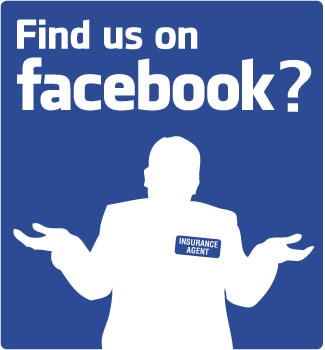Why your insurance agent may not be on Facebook
Is your insurance agent your Facebook friend? Most likely not. According to a survey by insurance data technology provider IVANS Inc., less than half of the 120 insurance agents questioned flock to social media, and just 14 percent use it as a way to engage with customers.
Although most major insurance companies have a significant presence on Facebook and Twitter, agents aren’t really taking advantage of the branding and marketing opportunities afforded by social media. But is this lack of social media use by insurance agents leaving insurance customers in the dark?
Why don’t insurance agents use social media?

Many insurance agents don’t want to invest time in a marketing method that they don’t believe will prove a worthy return on investment.
“They are used to face-to-face networking,” says Debbie Russell, a social media consultant who also works for an insurance company. “So much of their business comes from referrals.”
Russell believes most agents are looking for marketing methods that can immediately translate into dollars. She says they’re suspicious of the more passive marketing strategies used on social media platforms. Russell thinks that strategy is short-sighted.
“If they go to a networking event, they might waste two hours and walk away without any leads,” Russell says. “Why not devote two hours during the week to marketing yourself online instead?”
Stephen Forman, senior vice president of Long Term Care Associates, a long-term care insurance marketer in Bellevue, Wash., thinks there’s a generational gap as well. Many of the insurance agents at his firm are over age 50, he says, and “a lot of them feel this technology is foreign to them.”
What they’ve heard about social media may not give the best impression, either.
“People like Kim Kardashian are on Twitter, so they may think it’s unprofessional,” Forman says. “If they would get past their biases, though, they’d find there are 65 million people tweeting.”
Agents also could be concerned about their brands’ vulnerability in a public forum, and they have good reason to be. A report from Amplicate found that 70 percent of all social media discussions about health insurance were negative. While other types of insurance may not suffer from such negative reputations, agents and carriers remain apprehensive about allowing consumers to express their views on public forums such as Facebook.
What if your agent isn’t using social media?
Forman believes that for agents who don’t use social media services, the customers aren’t missing out, but the agents themselves are.
“It’s a missed opportunity,” he says. “Policyholders aren’t lacking any kind of essential service, but agents are missing the chance to engage with their policyholders and add more levels of service. It’s a great way to create loyalty, engagement, and referrals.”
Because the pool of agents who are actively using social media is small, those who choose to take the plunge can stand to benefit.
“Social media is a great way to reach out to people that you would simply not meet any other way,” says Marcus Head, owner of Head South Assure Group Inc., an insurance agency in Georgia. “The fact that many insurance agents aren’t yet on social media works in my favor, since it’s still a shallow pond and I can make quite a ripple.”
How should agents use social media?
For those agents who do use social media to market their agencies, Russell recommends starting with a blog, which she says can demonstrate expertise in the agent’s industry.
“When these guys go to sell to a prospect, they Google the prospect’s name,” says Russell, the social media consultant. “They don’t realize their prospects are doing the same thing to them.”
She also recommends that agents use LinkedIn to connect with colleagues and customers, and put links to recent blog posts there.
A Facebook fan page can also be a great way to connect with customers — but agents should be careful not to focus too much on sales, or they may alienate their fans. Instead, they should provide messages and links that will be of value to their customers. For instance, a home insurance agent might share tips about winterizing your home, Russell says.
Forman sends Twitter messages several times a day on behalf of Long Term Care Associates.
“I detest spam and am careful about posting meaningful content,” he says. “We participate in Twitter chats on Tuesday with colleagues, use Twitter to cross-promote articles and commentary I’ve posted, and link to information from our newsletter.”
Rather than using Twitter to market Long Term Care Associates’ services, he focuses on providing a valuable resource to agents, customers and prospects.
“You have to let consumers and agents find you by the quality of your content and say, ‘I think I’m ready to shop for insurance — who’s out there?’” Forman says.
Forman doesn’t play close attention to whether his Twitter efforts have led to increased sales. “I’m in it for the long haul,” he says. “It’s part of building our brand.”
